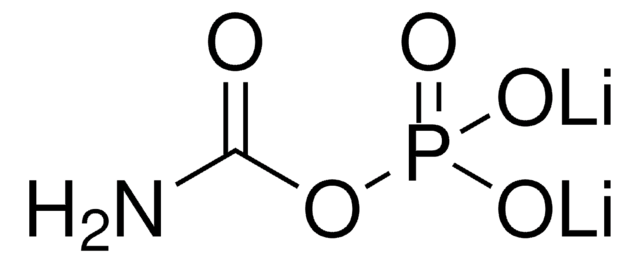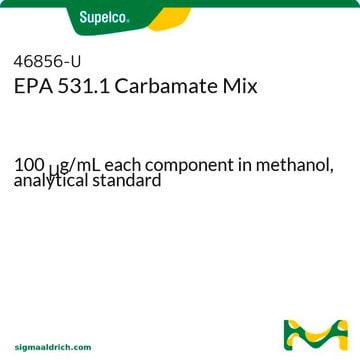292834
Ammonium carbamate
99%
Synonym(s):
Carbamic acid ammonium salt
About This Item
Recommended Products
vapor pressure
100 mmHg ( 26.7 °C)
Quality Level
Assay
99%
form
powder or chunks
expl. lim.
2 %
storage temp.
2-8°C
SMILES string
[H]N([H])[H].NC(O)=O
InChI
1S/CH3NO2.H3N/c2-1(3)4;/h2H2,(H,3,4);1H3
InChI key
BVCZEBOGSOYJJT-UHFFFAOYSA-N
Looking for similar products? Visit Product Comparison Guide
Application
- Cooperative Carbon Dioxide Capture in Diamine-Appended Magnesium-Olsalazine Frameworks.: This article discusses a novel method for carbon dioxide capture using diamine-appended frameworks, where ammonium carbamate serves as a key chemical intermediate. This research underscores the environmental benefits of using ammonium carbamate in carbon capture technologies, contributing to efforts to mitigate climate change (Zhu et al., 2023).
Signal Word
Danger
Hazard Statements
Precautionary Statements
Hazard Classifications
Acute Tox. 4 Oral - Eye Dam. 1 - Skin Irrit. 2
Storage Class Code
11 - Combustible Solids
WGK
WGK 1
Flash Point(F)
Not applicable
Flash Point(C)
Not applicable
Personal Protective Equipment
Certificates of Analysis (COA)
Search for Certificates of Analysis (COA) by entering the products Lot/Batch Number. Lot and Batch Numbers can be found on a product’s label following the words ‘Lot’ or ‘Batch’.
Already Own This Product?
Find documentation for the products that you have recently purchased in the Document Library.
Customers Also Viewed
Our team of scientists has experience in all areas of research including Life Science, Material Science, Chemical Synthesis, Chromatography, Analytical and many others.
Contact Technical Service






![[Bis(trifluoroacetoxy)iodo]benzene 97%](/deepweb/assets/sigmaaldrich/product/structures/238/293/71fcde9a-4afb-4cf5-9c22-8d8d68bf1ba4/640/71fcde9a-4afb-4cf5-9c22-8d8d68bf1ba4.png)









